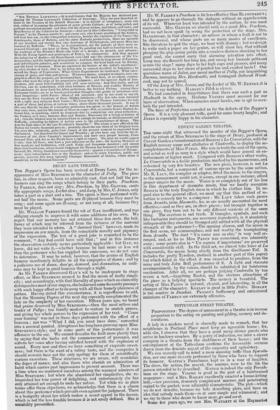DRURY LANE THEATRE.
THE Beggar's Opera has been revived at Drury Lane, for the re- appearance of Miss STEPHENS in the character of Polly. The piece has, in other respects, been so admirably cast, that not half the per- formers can sing the songs which belong to their parts. Peach-um, by FARREN, does not sing; Mrs. Peachum, by Mrs. GLOVER, omits the appropriate songs, Locket also ; and Lucy, by Mrs. C. JONES, only takes a part in a duet and a trio. The opera is thus performed with- out half the music. Some parts are ill-played because they must be sung; and some again are ill-sung, or not sung at all, because they must be played. Mr. WILLIAM FARREN found the wit of GAY insufficient, and was obliging enough to improve it with some additions of his own. We regret that our memory has not retained these bon mots, the bril- liancy of which may be inferred from the richness of the material they were intended to adorn. A "damned thief," however, made its impression on our minds, from the remarkable novelty and piquancy of the expression. The test of a good joke is remarked to be the comment, " AnY fool could have said that ; " and in this instance the observation certainly seems particularly applicable: but GAY, we know, did not write it,—whether because he had more or less wit than the performer who has supplied his omissions, we do not care to determine. It may be noted, however, that the genius of English humour inordinately delights in all the conjugates of damn; and by a judicious use of damn, dam' ye, damned, and damnation, an audi- ence may be kept in good humour through a night. As Mr. FARREN discovered GAY'S wit to be inadequate to stage effect, so Miss STEPHENS seemed to find the music of faulty simpli- city; and accordingly, with that liberality of grace which so eminently distinguishes most of our singers, she bedizened some favourite passages with such happy effect as to do away with all their homely plainness of • pathos. Having stated this circumstance, it is superfluous to add, that the Morning Papers of the next day especially complimented the lady on the simplicity of her execution. Fifteen years ago, we heard that praise deserved by Miss STEPHENS,--then the most artless and tender of Pollys ; too timidly modest to venture to snatch graces, and giving her whole powers to the expression of her text. "Cease your funmng" was not in those days performed with the effect of a bravura ; nor was "What I did, you must have done," converted into a musical gambol. Abruptness has longbeen growing upon Miss STEPHENS'S style; and in some parts of this performance it was offensive to the ear. We cannot describe the fault more plainly than by saying that she barks out the commencement of passages, and softens her voice after having satisfied herself with the explosion of sound. Every now and then we have something of exquisite sweet- ness; but there is the want of a ruling taste, and the escapades it should restrain have not the only apology for them of scientifically curious execution. These strictures, we are aware, will scandalize the dupes of names, and also those who cherish an admiration of habit which carries past impressions to present account. There was a time when we numbered ourselves among the warmest admirers of Miss STEPHENS; but when she abandoned her simplicities, she re- linquished her true power of delighting, and unfortunately she has only attained art enough to undo her nature. Yet while we in plain terms offer these objections, we acknowledge that there is a charm about this performer which prevails even against the judgment. There is a benignity about her which makes a secret appeal to the favour, which is not the less forcible because it is not easily defined. She is amiability personified, Mr. W. FARREN'S Peachum is far less effective than BLA.NCHARD'S and he appears to go through the dialogue without an apprehension of its wit. Wherever least was intended by the author, he was most successful. Mrs. GLOVER we should rank as a good Mrs. Peachum, had we not been spoilt by seeing the perfection of the stage, Mrs. DAVENPORT, in that character; an actress in whom a fault is not to be discovered, and whose parts are so many modes of excellence. She threatens to quit the stage, we hear with dismay ; but we design to write such a paper on her genius, as will show her, that without plunging the play-going public into a cureless distress shocking to her good soul, she cannot carry that alarming intention into effect. Long may she flourish her long fau, and sweep her brocade petticoat across the stage ! many days to her high caps and pinners, and many successful steps to her shoes of pointed toe and exalted heels ! Our querulous nurse of Juliet, our moral mother of Polly, our languishing Duenna, managing Mrs. Hardcastle, and termagant Deborah Wood- cock, may not be spared. Of the Lucy of Mrs. JONES, and the Locket of Mr. W. BENNET, it is better to say nothing. HARLEY'S FaCh is clever. We had concluded in forgethdness that there was such a part as Macheath in the opera. Madame VESTRIS must account .tbr our lapse of observation. When canaries enact hawks, one is apt to over- look the part intended. The farce of PeKfection consoled us for the defects of the Beggar's Opera. It is a very pleasant trifle, good for some hearty laughs ; and JONES is especially happy in his character.


















 Previous page
Previous page